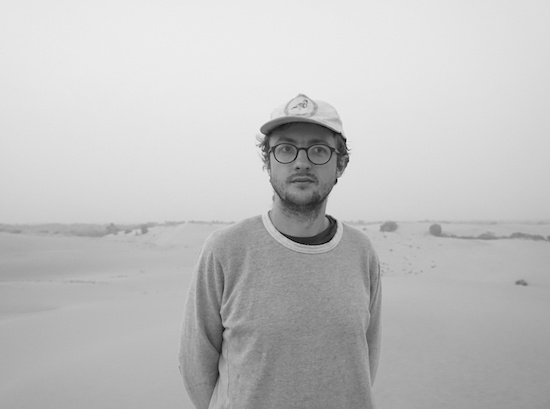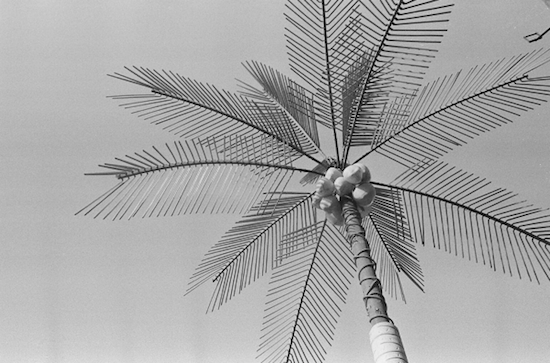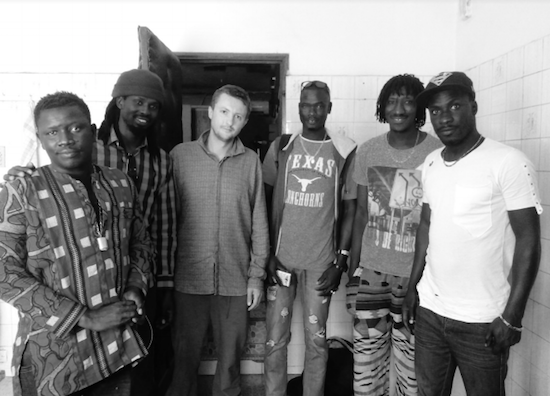Portraits by Anna Wood
I. Mbalax
"Mbalax is what we’re born with," says Senegalese percussionist Khadim Mbaye. An accomplished sabar drummer and one-third of Paradise Cinema – along with Tons Sambe on tama drums and Jack Wyllie of Szun Waves and Portico Quartet on sax, synths, and production – Mbaye has been playing for over thirty years with the likes of Cheikh Lô, Ismaël Lô, and the legendary Youssou N’Dour, among others. "It’s the rhythm in Dakar," he concludes.
In one sense, mbalax can be considered a specific thing: traditional rhythms popularised as a fusion dance music genre in the 1970s, but ultimately rooted, at least in part, in the ndut rites of the Serer, which mark the passage from childhood to adulthood. In another sense, it could perhaps be argued that mbalax is even more slippery than that, as much an idea as anything, seeding myriad aspects of contemporary Senegalese culture.
"When Youssou N’Dour was Minister of Culture for a while, he declared mbalax music the national music of Senegal," says Wyllie. "It’s permeated into all different kind of kinds of music: pop and soul and hip hop – there’s a really big hip hop scene in Senegal. So, when you’re in the city, you just hear those rhythms everywhere."
In a similar way, mbalax sits at the heart of Paradise Cinema’s self-titled debut LP. While the incredible polyrhythms that accompany the record’s bright orange ambient washes and wild sax freak outs embody aspects of the mbalax rhythmic tradition, they aren’t really mbalax, traditionally speaking. They exist somewhere else as something else. Still, as the album plays out, the idea of mbalax is impossible to escape. The rhythm of Dakar is everywhere.
II. Dakar
A brief, reductive history: Cap-Vert was settled in the 15th century at the latest by the Lebu people, who still call Dakar home. Not long after, Portuguese slavers showed up. Soon after that, Diogo Gomes made "peaceful" contact. Less than one-hundred years later, the Portuguese founded a colony on the island of Gorée, the smallest of modern-day Dakar’s nineteen communes d’arrondissement, which became a hub for the Atlantic slave trade. It subsequently changed hands between various colonising, slave-trading European powers, eventually falling under the rule of the French, who annexed the Cap-Vert peninsula itself in the mid-19th century. They took it from the Lebu, who had asserted their independence from Cayor in the late 18th century, who had themselves seceded from Jolof about 250 years before. Dakar’s history as a civic entity began in 1857 as a French military base. It became a French commune in 1887. For less than a year, after gaining independence from France, it was the capital of the Mali Federation before becoming the capital of an independent Senegal in 1960. Today, metropolitan Dakar is a melting pot, with a population of roughly 2.45 million people culturally influenced by a variety of local and diasporic types of music, which in a roundabout way, brings us back to mbalax and Paradise Cinema.
"The flat I was staying in was on the fourth floor of this block," recalls Wyllie. "Senegal at night, especially during Ramadan is just – the music goes on. Most nights chanting, the drumming goes on until really late at night – these big washes of drums and chanting. That gave me a bit of inspiration, I think. Hearing this night soundscape, all of this music washing together."
Throughout 2018 and 2019, Wyllie spent about seven months in Dakar, Senegal, off and on. His girlfriend, Anna, was doing anthropological fieldwork on "social security and the informal networks of people that often take the place of social security systems," he says. He decided to join her.
"I do sound design stuff as well, and a little bit of more commercial composition, which I was able to do remotely," says Wyllie. "And if I wasn’t working, I was sort of just going around Dakar."
When asked if he intended to record a record while in Senegal, Wyllie replies, "Before we went out, I was like, ‘I’d love to be able to do something as a way to engage with the city and with people,’ you know? Because I suppose there’s the idea that music can be a way to communicate and be expressive in that sense. I thought it’d be nice to make something, but I didn’t quite know what it was at the time."
He continues, "I guess I went out there not really knowing a huge amount about it. So, a lot of [my time] was spent exploring what kind of music was going on there, and how it worked out in the city. Basically, the dominant music in Senegal is mbalax music, and it’s got those quite fast, uptempo rhythms, up to like 220 BPM or something like that. It’s very Senegalese music. So, I started learning more about it and going out to see quite a lot of it. That’s how I met Khadim [Mbaye] – through some mutual friends – but I saw him play."
"My father was a percussionist, my family are percussionists. They’re all percussionists," says Mbaye, who in his own way is a bridge between traditional and post-colonial, post-diaspora, contemporary Dakar. His father was a griot, traditional communicators and musicians – often communicators through music – who function as fonts of oral history. Mbaye considers himself one, too. But his father played other forms of music as well, often with family, gigging on variété and jazz in hotels around the city. Mbaye followed suit, studying "jazz, salsa, Latin, everything" before cementing his reputation in various mbalax groups in Dakar.
With Mbaye on board, Wyllie was inspired. "From there, I was thinking of ways that I could combine the music that I grew up with – all the music that I’m interested in – with those rhythms in a way that’s not like Senegalese music, but not like the music that I make, either. Music that sits somewhere outside of that, kind of somewhere in between," he says. "I was quite into John Hassell’s stuff when I was out there as well – that idea of fourth world music – and [looking for] a way to make it so it didn’t feel extractive, a way that felt like something new."

III. Different Ways Of Knowing
To find a studio, Wyllie called upon Matt Tinari, known for his work with Noura Mint Seymali. "Matt’s married to a Senegalese woman and lives out in Dakar. He knows a lot of musicians there and is quite tapped into the network of recording studios," says Wyllie. " So, I asked him about it, and he was just like, ‘There’s this studio here and there’s this guy who’s great to work with. This guy called Mao Sidibé who’s a great musician in his own right.’ Anyway, through Matt, I got in touch with Mao who ran the studio, and he really helped me out in putting everything together on the organizational side of things."
For his part, Mbaye enlisted Sambe, his student, recognising that adding another player would allow them to explore more options live in the studio.
"We recorded the base of it at Sidibé’s studio, but I did quite a bit of post-production to it as well. The core of the tracks we did there, we did live," Wyllie recalls. "There was a lot of chat about the rhythms we were going to do. There were some that I kind of had in mind, but then Khadim’s obviously expanding on that. And his cousin was there as well, who’s also a percussionist. So, it’s Khadim, Tons [Sambe], and his cousin, and they were talking about ways to play at different tempos. I was thinking that maybe we could try new stuff that’s kind of outside of traditional mbalax tempo, and they were coming up with these rhythms that weren’t necessarily traditional but fit in with the music and what we were trying to do."
"The other thing was, my French is – it’s kind of okay. Kind of conversational-ish. Khadim’s is similar to mine, in that we can kind of have a chat, but it’s not the most fluid. So, Anna was translating into Wolof and another guy there called Indy who spoke pretty good English was translating into Wolof as well. So, there were levels of translating that were going on," Wyllie says. "But it was really nice and quite interesting, too, to see Khadim talking about the ways in which these rhythms would come together and work with the music."
As Wyllie describes it, the recording process was more about capturing layers of sound one at a time than it was about playing compositions live in the studio. "The percussion is quite layered. At some point there are like six or seven parts going on. So, there were points where we put down a bass rhythm and some sax parts with some other bits as well, then Khadim and Tons would do another couple of layers on top of that," he explains. "There are some bits as well, where in post-production, I’d slow down some of the parts quite a bit, so they were running at different tempos. So, there’s a live recording of it, I suppose, and then there was a lot of stuff that went on to bulk it out and change the sounds."
One of the most captivating aspects of listening to Paradise Cinema is the way disparate sounds combine in counterintuitive ways to convey a unified feeling, filling the listener up with a slightly wistful but optimistic, euphoric warm glow. Even at its most intense, drums that in a different context could send you reeling never do. Sax skronk that could scour and abrade never does. These aspects are tempered by deft mixing and production and the smart juxtaposition of ambient elements that work hand in hand with the saxophone and percussion to pull the listener toward a transcendent kind of reflection. If this sounds dull, it isn’t. The album is thrilling.
"Yeah, it’s funny. At first, when I was like, ‘I’d quite like to make a record,’ one of the first things that I thought of when I was in Senegal was having this combination. In its very embryonic stage, I was like, ‘Right, it’d be great to have these drums and then a kind of ambient side to it as well.’ That was the genesis of it, I guess. That was at the core of the project," recalls Wyllie. "A lot of the washy synth stuff is actually quite metred, weirdly. A lot of the synths are really layered saxophones. It’s basically using a stereo delay setting and making these tiny, little loops to tempo, so they would lock in quite tightly with the rhythmic stuff. There’s little things like that in it. That’s part of what makes it gel. But also, when you’re nodding off to the music of the city at night, it’s like you’re half-awake and half in a dream, and I felt like I wanted to bring that through as well. It’s slightly hypnogogic – there’s a dreamlike sense to it."

IV. Paradise Cinemas
Listening to Paradise Cinema can often feel like listening to a speculative future from the past. It’s almost hauntological in that sense, a little nostalgic for a future that never happened.
"There’s all of these old cinemas around Dakar – like fifty of them. They were built in just post-independence Senegal with this huge arts budget," says Wyllie. "I think one of the things that influenced the record was the real sense of optimism in that period, in 1960s, 1970s Senegal. That’s where the title for that track ‘Possible Futures’ come from. [But then Senegal was] absolutely battered by structural adjustment policies in the 1980s and 1990s. The World Bank and IMF really screwed Senegal over."
"Those big, modernist cinemas look pretty amazing, actually. Now they’re derelict – I don’t think any of them are in use anymore. They were something that I was interested in afterwards. I made sense of the album through them retrospectively. It was like, ‘Oh yeah, that’s where the music can exist.’" Wyllie continues, "I think music does show you different possibilities. Like a possible way of doing things or possible way of being. That sort of feeling is what I tried to put into the record, but I’m also quite conscious of not wanting to make a statement. Clearly, I’m from England. I don’t want to make a statement about Senegal without being Senegalese. But I don’t think Paradise Cinema is that, and it’s not supposed to be that."
The sense of optimism that bolstered post-independence Senegal and runs throughout Paradise Cinema hasn’t completely dissipated, although it’s been significantly tempered by reality. Senegal is one of the poorest countries in the world. Still, it’s not as if it exists in a sort of stasis. "Now is an exciting time for Senegal in that there is a sense of optimism again," posits Wyllie. "There’s definitely some amazing stuff going on there not just culturally, but also a lot of really exciting projects. They’ve started a universal health care system, which is just getting off the ground. There is definitely optimism there." Mbaye, too, is "hopeful about the future of Senegal and hopeful there could be more work and more money for the Senegalese."
Wyllie is upfront about issues of appropriation and exploitation in the arts today, and the heightened awareness around them. "Obviously, I think you need to make sure everyone’s properly credited and properly remunerated. I think I’ve done both of those with Khadim and Tons. They’ve both got royalties on the album. But you don’t want to be patronising about it. You want people to feel like the music says something that everyone wants to be engaged with."
He continues, "I approached Khadim, and then in that same sense, Khadim wanted to work on it as well. So, there’s this genuine engagement with what’s going on. Hopefully, musically that comes across. I heard someone describe some of John Hassell’s ideas as incorporating different ways of knowing. Khadim and Tons have got their kind of way of making music and ways of knowing, and the way that interacts with some of the stuff that I’ve made is what creates the final thing, which then sits outside of anything particularly Senegalese or particularly Western for want of a better word."
"It’s got African culture in it," says Mbaye. "White people will listen to it – they’re going to hear the African experience. Really, it’s super."


